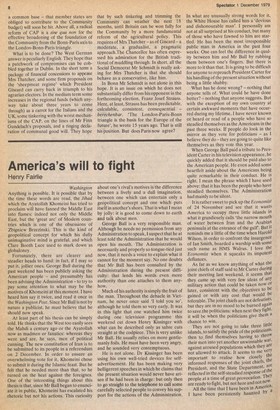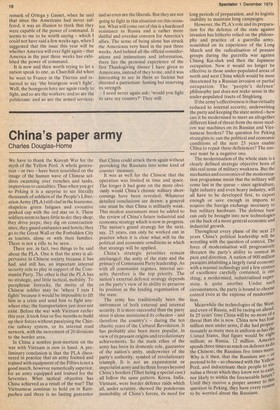America's will to fight
Henry Fairlie
Washington Anything is possible. It is possible that by the time these words are read, the Jihad which the Ayatollah Khomeini has tried to proclaim will have fanned the Middle East into flames: indeed not only the Middle East, but the 'great arc' of Moslem countries which is one of the obsessions of Zbigniew Brzezinski. This is the kind of geopolitical concept for which his dully unimaginative mind is grateful, and which Clare Booth Luce used to mark down as globaloney.
Fortunately, there are clearer and steadier heads to hand: in fact, if I may so put it, jollier ones. George Ball during the past weekend has been publicly asking the American people — and presumably has been advising the Administration — to try to pay some attention to what may be the motives of Khomeini at this moment. I have heard him say it twice, and read it once in the Washington Post. Since Mr Ball is not by nature a publicist, he must believe that he should now speak.
At least part of his thesis can be simply told. He thinks that the West too easily sees the Mahdi a century ago or the Ayatollah now as madmen or fanatics: whereas they were and are, he says, men of political cunning. The new constitution of Iran is to be submitted to its people in a referendum on 2 December. In order to ensure an overwhelming vote for it, Khomeini chose to submit it during the Islamic feast. But he felt that he needed more than that, so he turned on the heat against the foreigner.. One of the interesting things about this thesis is that, since Mr Ball began to enunciate it in public, Khomeini has escalated his rhetoric but not his actions. This curiosity about one's rival's motives is the difference between a lively and a dull imagination, between one which can entertain only a geopolitical concept and one which puts itself in another's shoes. That is what! mean by jolly: it is good to come down to earth and talk about men.
George Ball is a very responsible man. Although he needs no permission from any Administration to speak, I suspect that he at least told the Administration that he would open his mouth. The Administration is necessarily and properly so tongue-tied just now, that it needs a voice to explain what it cannot for the moment say. No one doubts that Mr Ball has been consulted by the Administration during the present difficulty: that lends his words even more authority than one attaches to them anyhow.
Much of his authority is simply the fruit of the man. Throughout the debacle in Vietnam, he never once said 'I told you so', although he told them so very early. It was in this light that one watched him twice during one television programme this weekend cut down Henry Kissinger with what can be described only as sabre cuts straight at the codpiece. This is very unlike Mr Ball. He usually relies on more gentlemanly foils. He must have been very angry, and he sounded very contemptuous.
He is not alone. Dr Kissinger has been using his own well-tried devices for selfadvertisement. He has been making very belligerent speeches in which he claims that the present situation would never have arisen if he had been in charge: but only then to go straight to the telephone to call some carefully selected people to convey his support for the actions of the Administration. In what are unusually strong words for it, the White House has called him a 'devious and dishonourable man'. I personally am not at all surprised at his conduct, but many of those who have fawned to hint are startled. He has been the most irresponsible public man in America in the past four weeks. One can feel the difference in quality between him and Mr Ball by rubbing them between one's fingers. But there is more to it than that. It is going to be difficult for anyone to reproach President Carter for his handling of the present situation without being a little shabby.
What has he done wrong? — nothing that anyone tells of. What could he have done better? — nothing that anyone suggests. But with the exception of my own country at certain awkward moments that have occurred during my lifetime, I have never known or heard or read of a people who have so steadied themselves as the Americans in the past three weeks. If people do look in the mirror as they vote for politicians — as I believe they do — they are going to quite like themselves as they vote this year.
When George Ball paid a tribute to President Carter in his television appearance, he quickly added that it should be paid also to the American people. He even added some heartfelt aside about the Americans being quite remarkable in their conduct. He is right. I mean the phrase which I have used above: that it has been the people who have steadied themselves. The Administration had mainly to be silent.
It is rather sweet to pick up the Economist of 24 November and see that it wants America to occupy three little islands in what it grandiosely calls 'the narrow mouth of water between Iran and the Arabian peninsula at the entrance of the gulf'. But it reminds me a little of the time when Harold Wilson, in order to confront the insurgence of Ian Smith, boarded a warship with some such name as HMS Walrus. I love the Economist when it squeaks its impotent defiance s.
As far as we know anything of what the joint chiefs of staff said to Mr Carter during their meeting last weekend, it seems that they came up with very few ideas of anY military action that could be taken now or later, consistent with the objectives to be gained or with any cost that would be tolerable. The joint chiefs are not defeatists, but they are in no mood to be burned again to save the politicians: when next they fight, it will be when the politicians give them a chance to win. They are not going to take three little islands, to satisfy the pride of the politicians, then to find themselves having to throw their men into yet another unwinnable war, against aroused populations which they are not allowed to attack. It seems to me very important to realise how closely the informed responses of the joint chiefs, the President, and the State Department, are reflected in the self-steadied response of the people at a time of great provocation. TbeY are ready to fight, but not here and not novv, All the time that I have been in Amer!" I have been persistently haunted by a remark of Ortega y Gasset, when he said that since the Americans had never suffered, it was an illusion to think that they were capable of the power of command. It seems to me to be worth saying — which I could not have said a few weeks ago, when I suggested that the issue this year will be whether America will ever fight again — that America in the past three weeks has exhibited the power of command.
It is now and then worth trying to let a nation speak to one, as Churchill did when he went to France in the Thirties and returned to say 'the bourgeois won't fight'. Well, the bourgeois here are again ready to fight, and so are the workers: and so are the politicians: and so are the armed services: and so even are the liberals. But they are not going to fight in this situation on this occasion. What will come out of this is a hardened resistance to Russia and a rather more dutiful and overdue concern for America's allies. The sense of being alone has struck the Americans very hard in the past three weeks. And behind all the official considerations and intimations and information, there lies the personal experience of the first Thanksgiving dinner I have given to Americans, instead of they to me, and it was interesting to see in them so furious but directed a patriotism; fuming but reserving its strength.
I need never again ask: 'would you fight to save my country?' They will.












































 Previous page
Previous page